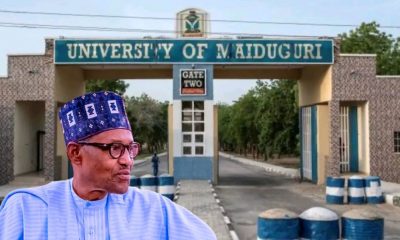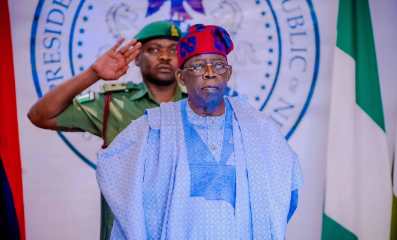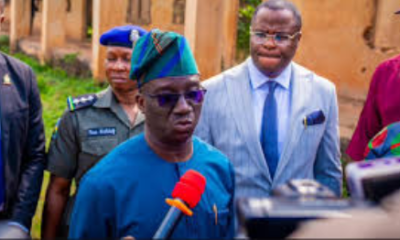Comments and Issues
Federal Government, ASUU and the Judiciary
Just before the National Industrial Court of Nigeria (NICN) dubiously suspicious but expected go-back-to-work order, ASUU President had queried: what benefit would it be to the nation if professors were compelled to go back to the classrooms without their demands being met by government?
Published
3 years agoon
By
Publisher
By Hope ‘O’Rukevbe Eghagha
So it was that in the dingdong end-strike and don’t-end-strike affair between the almighty Federal Government and Academic Staff Union of Universities (ASUU), the former deployed the hammer and anvil, carpenter and nail, and soldier and enemy approach to try and bully the intellectual powerhouse of the country into a humiliating submission.
To be sure, no union of academics worth its salt would allow a government of rudderless buccaneers who in seven years have ruined the nation’s economy, escalated the insecurity level in the country to run aground its high-ground moral ship and consign it to the ashes of history.
Also read: Jega slams Ngige over ASUU strike
General Yakubu Gowon in the zenith of his drunken-sailor days in military power could not decimate the union, not even with threats of and ejection of bewildered staff from official quarters.
The Great IBB, epitome of military power and egregiousness, could not intimidate ASUU, though that dribbler of a government banned and unbanned ASUU. He later approved a better welfare package for academics.
So, who are these white garment charlatans and urchins in the corridors of transient power masquerading as Holy Reverend Fathers from the Papacy? Our elders say that ‘a warrior is not a wrestler; he is killed the moment his spear and shield are overpowered’.
Also read: Atiku speaks on education, ASUU strike, teachers’ salaries
Just before the National Industrial Court of Nigeria (NICN) dubiously suspicious but expected go-back-to-work order, ASUU President had queried: what benefit would it be to the nation if professors were compelled to go back to the classrooms without their demands being met by government?
As a corollary he asked whether if a horse was forced to the stream would it be forced to drink too? Was this an expression of defeat? Acceptance albeit subtle of the immense power of the federal government? But ASUU leadership rose to the occasion: an appeal has been filed for a stay of execution order before the Federal Court of Appeal.
From all indications, the matter could reach the Supreme Court! The dingdong will continue. The grass will suffer. The nation will lose out ultimately!
In the aftermath of the order, academics were unanimous in their verdict: the federal government had deployed its notorious arsenal to securing a pro-government verdict.
The merits and demerits of the ASUU case were no longer in contention. Public sympathy was in favour of the striking academics. Some TV commentators on Arise TV and other stations went overboard with some asinine comments, pontificating as usual on all topics in the manner of Jack-of-all-trades-and-master-of-none! ‘No research is going on in our universities’.
‘Where are the Sanya Onabamiros’, they asked? ‘If you don’t work don’t expect to be paid! And so on. And I said to myself: when an iroko tree falls even women can cut chunks off for firewood.
Most members of the public do not understand that while the strike was ongoing, papers were still being written, some still traveled to attend conferences, went out of the country on fellowships, visited the laboratory every day.
My first and most acclaimed creative work – Death Not a Redeemer– was written during the long strike of 1992. Most are not aware that professors were reading, assessing Masters and PhD theses. That they were assessing upcoming academics for promotion to the next level.
So, it is inanity to argue that during strikes, academics do not work. Teaching services are withdrawn, yes, but other activities do not stop.
It was and is indeed humiliating that the salary scale of professors became a topic on social media and marketplace gossip, with some ignorant fellows castigating the professors for aspiring to earn as much pay as federal legislators.
Some castigated ASUU members for helping to rig politicians into office during elections. When the salaries of legislators and government appointees are fixed, it is done quietly, often arbitrarily, without any input from the public.
The federal government must have a rethink on its current approach. When the late General Murtala Mohammed purged the federal civil service on account of corruption, he thought he was cleansing the nation; but it turned out that he destroyed the civil service for ever.
ASUU should re-strategize on methods to achieve its goals going forward because it is dealing with an unusual government that is bent on ‘putting ASUU in its place’ especially with the mindset of Aso Rock. The matter is likely to get to Supreme Court. This will not help anyone in the system.
Collectively, we should develop another model of funding tertiary education in the country. Education without beneficiaries paying for tuition in the universities is a recipe for disaster.
Education is not free; somebody pays for. Somebody should pay for it. The federal government has opted to bear the cost running its universities. So, government must make up its mind. It must either bear the cost of tuition require beneficiaries to pay for tuition.
The state governments are more pragmatic in this regard. Students pay for tuition albeit in a roundabout manner. Also, the nation is skewed culturally and socially to favour university education as the only means of getting recognition.
Of course, the world has moved beyond that stage now. We must now direct our youth who cannot enter university to embrace skills acquisition programmes. The best IT engineers around the world we are told are not necessarily university graduates.
The dingdong affair has taken a dimension as I earlier indicated that will favour no one. ASUU has appealed against the lower court’s decision. The federal government initially directed Vice Chancellors to reopen universities and withdrew the order after receiving sound advice from stakeholders that that was not the way to go.
The VCs did not shut down the universities; so they are not expected to reopen what they did not close down. Where are the keys?
The keys to reopening the universities lie with both the government and ASUU. Collective bargaining without any rigid positions can help. Perhaps through back-channels government should ask ASUU: what is the minimum you can accept?
There should be informal meetings between parties to wriggle the nation out of education comatose. This is where diplomacy and the art of negotiation should help. There should be no war of attrition. Government must realise that ASUU currently enjoys wide public sympathy. People are scandalized about the salary scale of university professors.
If we are in a democracy, this should count. No government should go into general elections when its universities have been under lock and key for over seven months, except it deliberately wants to lose the election! Is someone listening to the third, inner voice?
You may like


ASUU-UNIMAID to sue Nigerian government over university renaming to Muhammadu Buhari university


NANS commends Tinubu for N50bn ASUU, varsity staff fund


Man, 39, docked for alleged N560,000 theft


APC, Okpebholo in Disarray, Unable to Defend Sept 21 Electoral Heist


Body of Benchers to call 9,000 lawyers to bar in 2025


Edo Governor Okpebholo approves reinstatement of disengaged AAU staff
Trending

 Entertainment5 days ago
Entertainment5 days agoSimi addresses resurfaced 2012 tweets amid online backlash

 Health1 week ago
Health1 week agoSCFN, LUTH introduce bone marrow transplants as curative treatment for sickle cell

 Health4 days ago
Health4 days agoDeclassified CIA memo explored concealing mind-control drugs in vaccines

 Football1 week ago
Football1 week agoHarry Kane nets brace as Bayern edge Frankfurt 3–2 to go nine points clear

 Football1 week ago
Football1 week agoLate Flemming header stuns Chelsea as Burnley snatch 1–1 draw at Stamford Bridge

 Crime4 days ago
Crime4 days agoSenior police officers faces retirement after Disu’s appointment as acting IGP

 Crime1 week ago
Crime1 week agoTwo killed, seven injured in early-morning shooting in Richmond’s Shockoe Bottom

 Education6 days ago
Education6 days agoPeter Obi urges JAMB to address registration challenges ahead of exams

